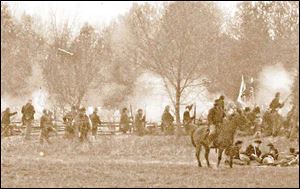
A truly terrible time: Civil War puts our problems in perspective
4/17/2011
A photograph of the battle of Shiloh.
It is unimaginable in a modern context to consider just how traumatic the Civil War must have been.
We tend to view current times through a self-important lens that often leads us to conclude that now — whenever that is on history’s endless time line, whether it’s the Great Depression, World War II, or literally now — as quite possibly the most complex, difficult, and perilous time ever.
Our budget deficits could ruin the country. Wars in the Middle East loom large and threaten to turn into something truly catastrophic. Unemployment is high. Obesity is rampant, health care costs are through the roof, and, oh yes, global warming is destroying the planet. On and on it goes, this pervasive feeling of doom that humanity learns to live with and that casts the future in terminal doubt.
Nov. 6, 1860 — Abraham Lincoln is elected president.
Dec. 20, 1860 —South Carolina secedes from the Union, followed by Mississippi, Florida, Alabama, Georgia, Louisiana, and Texas.
Feb. 9, 1861 — The Confederate States of America is formed with Jefferson Davis as its president.
April 12, 1861 — Confederate troops attack Fort Sumter, officially beginning the Civil War.
April 17, 1861 — Virginia secedes from the Union, followed by Arkansas, Tennessee, and North Carolina, forming an 11-state Confederacy with a population of 9 million, including more than 3.5 million slaves.
July 21, 1861 — The Union army suffers a defeat at the first battle of Bull Run near Washington.
April 6-7, 1862 — The battle of Shiloh leads to the deaths of 13,000 Union soldiers and 10,000 Confederate soldiers. The single battle causes more casualties than all the previous American wars combined.
Aug. 29-30, 1862 — The second battle of Bull Run is fought in northern Virginia and the Union forces are defeated again.
Sept. 17, 1862 — Fighting at Antietam leads to 26,000 casualties, making it the bloodiest battle in U.S. history to that point.
Jan. 1, 1863 — Lincoln issues the final Emancipation Proclamation, freeing all slaves in territories held by Confederates.
May 1-4, 1863 — The Union army suffers a decisive defeat at the hands of Confederat Gen. Robert E. Lee at Chancellorsville, Va.
July 1-3, 1863 — The war turns in favor of the Union during the epic battle of Gettysburg.
Nov. 19, 1863 — Lincoln delivers the two-minute Gettysburg Address at the site of the great fight.
March 9, 1864 — Gen. Ulysses S. Grant is appointed by Lincoln to command all of the United States armies.
May 4, 1864 — Gen. William Sherman’s “March to the Sea” begins.
Sept. 2, 1864 — Sherman takes Atlanta in a victory that helps secure Lincoln’s re-election.
Nov. 8, 1864 — Lincoln is re-elected.
Jan. 31, 1865 — Congress approves the 13th Amendment abolishing slavery.
April 9, 1865 — Lee surrenders to Grant at Appomattox Court House in Virginia.
April 14, 1865 — On the same day that the Stars and Stripes would be raised over Fort Sumter, Lincoln is shot by John Wilkes Booth. The president dies the next morning.
Dec. 6, 1865 — The 13th amendment is ratified by the states and slavery is finally abolished.
Source: Historyplace.com
Now imagine this: the country ripped in half after decades of political debate wrought by the founding fathers who, for all their great accomplishments, failed the country horribly by not resolving the slave problem once and for all in the 18th century.
The arguments we have now over collective bargaining seem trivial compared to the long-running debate about the slavery issue that occurred in the years after the Constitution was established. In fact, virtually every issue on our political agenda is trivial compared to what happened 150 years ago this week.
Over the four years, from 1861 to 1865, more than 600,000 people would die in the war and there would be more than a million casualties. The violence unleashed throughout those years still ripples through time.
At stake ultimately was the fate of more than 3.5 million residents of our country who were held as slaves. That there was no political solution to a problem that any reasonable person in modern times considers obvious — all people, no matter their race, should be considered equal — is emblematic of how different times were a century and a half ago.
So, while it’s a sobering thought, history is there to remind us that our current travails are usually not quite as epic as they may feel. Put another way, fixing the Social Security system ought to be a piece of cake compared to what America was going through 150 years ago.
Contact Rod Lockwood at rlockwood@theblade.com or 419-724-6159.